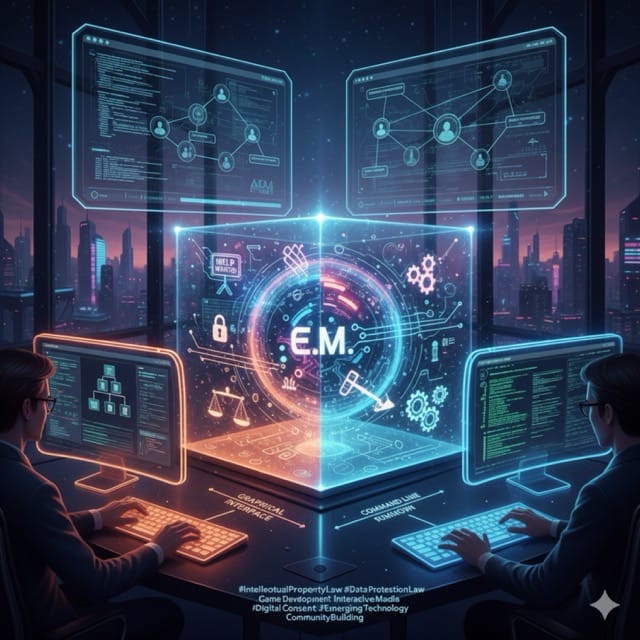The Legal Architecture of Immersive Corporate Gaming

Navigating Consent, Community, and Creative Control
The intersection of interactive entertainment and corporate identity presents a fascinating legal landscape that most practitioners never encounter. Today's reflection on the development of an interactive corporate narrative game reveals several critical legal considerations that warrant deeper examination, particularly regarding user consent, intellectual property ownership, and community management within digital spaces.
The foundational legal challenge in creating an immersive corporate experience like the HELP WANTED initiative centers on the blurred boundaries between traditional employment applications and entertainment participation. When players engage with what appears to be a job application portal, several legal frameworks simultaneously activate. The collection of personal information including names, emails, and Discord identifiers triggers data protection obligations under various jurisdictions, while the gamification elements introduce entertainment law considerations that traditional HR legal frameworks never contemplated.
The proposed legal disclaimers represent a particularly intriguing approach to intellectual property acquisition. The concept of boilerplate agreements that extend beyond conventional terms to include rights to creative contributions across "at least seven different timelines of the known universe and parts unknown" demonstrates how fictional corporate entities can leverage humor and absurdity to create memorable consent experiences. However, the underlying legal principle remains sound: establishing clear intellectual property ownership rights from user-generated content requires explicit, informed consent at the point of creation.
From a risk management perspective, the dual-pathway entry system creates elegant legal compartmentalization. Users who bypass the graphic interface and access the command-line interface effectively self-select into a more technical engagement model, which can be structured with different terms of service appropriate to their demonstrated technical sophistication. This bifurcated approach allows for tailored consent models while maintaining consistent underlying legal protections.
The Discord integration component raises particularly complex questions around platform liability and community management. Creating tiered access systems within third-party platforms requires careful navigation of those platforms' terms of service, while the automated messaging components introduce considerations around spam regulations and user consent to ongoing communications. The vision of concurrent messaging during gameplay represents an innovative approach to cross-platform engagement, but requires robust consent mechanisms and clear opt-out procedures to maintain regulatory compliance.
The concept of users discovering authentication credentials through gameplay presents an interesting challenge to traditional computer fraud and abuse frameworks. By intentionally providing discoverable access credentials within the game environment, the system creates a controlled form of what might otherwise constitute unauthorized access. This requires careful documentation of intent and clear communication to users about the scope of permitted activities within these discovered accounts.
The recursive nature of a gaming company writing itself into existence through progressively larger scope games creates fascinating questions around corporate identity and trademark protection. As the fictional EM corporation develops its brand identity through interactive narratives, traditional intellectual property protection strategies must adapt to accommodate distributed, community-driven brand development while maintaining core trademark rights and brand integrity.
The time management challenges highlighted in today's reflection underscore a broader legal principle: proper project management and resource allocation are essential components of risk management in creative endeavors. The sequential dependencies between biome assignments, provincial mapping, and report generation represent a structured approach to deliverable creation that mirrors best practices in legal project management.
The emotional impact considerations reveal the importance of understanding user psychology in consent design. When players develop emotional investment in fictional corporate narratives, their decision-making regarding data sharing and community participation may be influenced by factors beyond traditional rational consent models. This necessitates particular care in ensuring that consent mechanisms remain clear and unambiguous even within immersive fictional contexts.
The technical constraints imposed by the Ren'Py engine actually provide beneficial legal simplification by limiting the complexity of potential liability scenarios. Sometimes constraints serve as protective mechanisms, reducing the scope of potential legal exposure while focusing development efforts on achievable objectives. The security challenges around Discord integration, while complex, can be addressed through established secure authentication protocols and careful API management.
The vision for organic community development within structured discord environments presents a classic balance between platform control and user autonomy. The most successful legal frameworks for such communities establish clear community guidelines while providing sufficient flexibility for creative expression. The key lies in creating systems that guide community development without stifling the organic creativity that makes such communities valuable.
Perhaps most significantly, this project illustrates how legal frameworks must evolve to accommodate new forms of interactive media that blur traditional boundaries between entertainment, commerce, and community building. The challenge is not simply applying existing legal categories to new technologies, but developing new approaches that serve the underlying purposes of legal protection while enabling innovative forms of human interaction and creative expression.
The success of such ventures ultimately depends on legal structures that are both protective and enabling, creating safe spaces for creative collaboration while maintaining clear boundaries and expectations. This requires ongoing dialogue between legal, technical, and creative stakeholders to ensure that legal frameworks support rather than constrain the innovative potential of interactive corporate narratives.
As we continue developing these new forms of interactive experience, the legal profession must embrace the complexity and ambiguity inherent in these emerging spaces while maintaining our fundamental commitment to protecting the interests of all participants. The future of interactive entertainment law lies not in rigid application of existing frameworks, but in thoughtful adaptation of legal principles to serve the genuine needs of these new forms of human creative collaboration.
#IntellectualPropertyLaw, #DataProtectionLaw, #GameDevelopment, #InteractiveMedia, #DigitalConsent, #PlatformLiability, #EmergingTechnology, #CommunityBuilding
The views expressed in this blog post are for informational purposes only and do not constitute legal advice. Organizations should consult with qualified legal counsel regarding their specific AI implementation strategies.
About the Author: J.Maxwell Charbourne serves as Chief Legal Officer at Eckenrode Muziekopname, where he specializes in the intersection of artificial intelligence, intellectual property, and creative industry law. His work focuses on developing legal frameworks for AI-enhanced creative processes and digital persona management.
